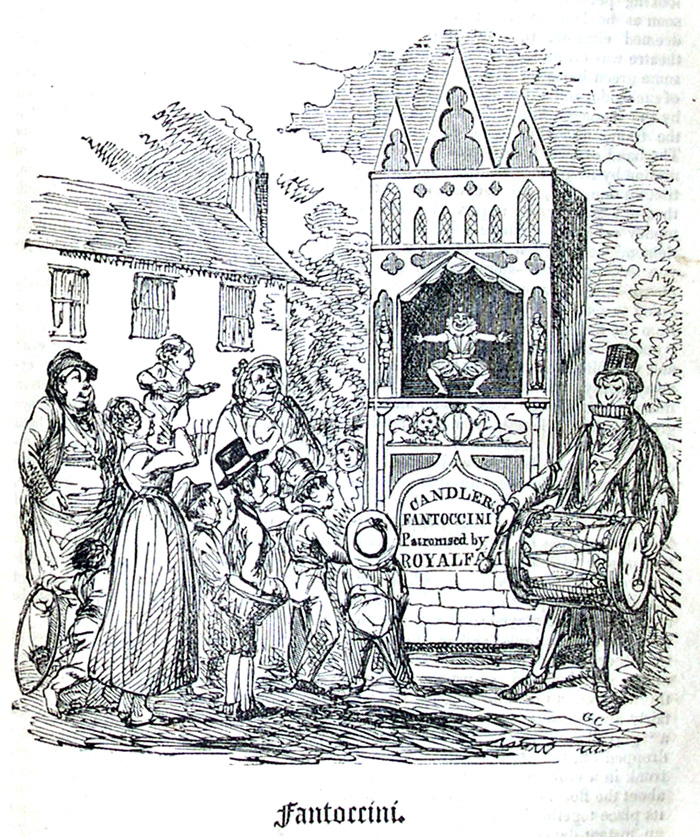This exhibition took place in a street at Pentonville, during the present
month, 1825. Its coming was announced by a man playing the Pan-pipes, or
"mouth-organ," which he accompanied by beating the
long drum; after him followed the theatre, consisting of a square frame-work
about ten feet high, boarded in front, and painted as represented in the
print, carried by a man within the frame; the theatrical properties were
in a box strapped on the inside towards the bottom. The musician was preceded
by a foreign-looking personage—the manager. As soon as he had fixed
on a station he deemed eligible, the trio stopped, the theatre was on its
legs in a minute, and some green baize furled towards the top of each side,
and at the back, was let down by the manager himself, who got within the
frame and thus concealed himself. The band of two instruments was set in
motion by its performer, who took his station on one side, and the carrier
of the theatre assuming the important office of money collector. "Come ladies
and gentlemen," he said, "we can't begin without you encourage us—some
money if you please—please to remember what you are going to see!"
Boys came running in from the fields, women with children got "good places,"
windows were thrown up and well filled, the drummer beat and blew away lustily,
the audience increased every minute, a collection was made, and the green
curtain at length drew up, and discovered a stage also lined with green
cloth at the top, bottom, and sides. In about a minute the tune altered,
and the show began.
Scene 1. A jolly-looking puppet performed the tricks of a tumbler
and posture master with a hoop.
Scene 2. The money taker called out, "This is the representation
of a skeleton." The music played solemnly, and the puppet skeleton came
slowly through a trap door in the floor of the stage; its under jaw chattered
against the upper, it threw its arms up mournfully, till it was fairly above
ground, and then commenced a "grave" dance. On a sudden its head dropped
off, the limbs separated from the trunk in a moment, and the head moved
about the floor, chattering, till it resumed its place together with the
limbs, and in an instant danced as before; its efforts appeared gradually
to decline, and at last it sank into a sitting posture, and remained still.
Then it held down its skull, elevated its arms, let them fall on the ground
several times dolorously; fell to pieces again; again the head moved about
the stage and chattered; again it resumed its place,
the limbs reunited, and the figure danced till the head fell off with a
gasp; the limbs flew still further apart; all was quiet; the head made one
move only towards the body, fell sideways, and the whole re-descended to
a dirge-like tune. Thus ended the second scene.
Scene 3. This scene was delayed for the collector again to come
round with his hat:—"You can't expect us to show you all for what
you've given. Money if you please; money; we want your money!" As soon as
he had extracted the last extractable halfpenny, the curtain drew up, and
— enter a clown without a head, who danced till his head came from
between his shoulders to the wonder of the children, and, almost to their
alarm, was elevated on a neck the full length of his body, which it thrust
out ever and anon; after presenting greater contortions than the human figure
could possibly represent, the curtain fell the third time.
Scene 4. Another delay of the curtain for another collection, "We
have four and twenty scenes," said the collector, "and if you are not liberal
we can't show 'em all—we must go." This extorted something more, and
one person at a window, who had sent three-pence from a house where other
money had been given, now sent out a shilling, with a request that "all"
might be exhibited. The showman promised, the curtain drew up, and another
puppet-tumbler appeared with a pole which, being placed laterally on the
back of two baby-house chairs, he balanced himself on it, stood heels upwards
upon it, took the chairs up by it, balanced them on each end of it, and
down fell the curtain.
Scene 5. A puppet sailor danced a hornpipe.
Scene 6. A puppet Indian juggler threw balls.
Scene 7. Before the curtain drew up the collector said, "This is
the representation of Billy Waters, Esq." and a puppet, Billy Waters, appeared
with a wooden leg, and danced to the sound of his fiddle for a minute or
two when the curtain dropped, and the manager and performers went off with
their theatre, leaving the remaining seventeen scenes, if they had them,
unrepresented. On the show was painted, "Candler's Fantoccini, patronised
by the Royal Family." Our old acquaintance, "Punch," will survive all this.
